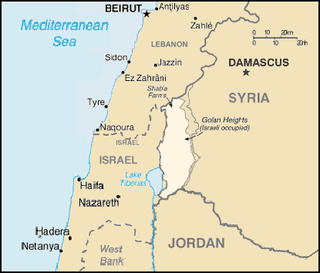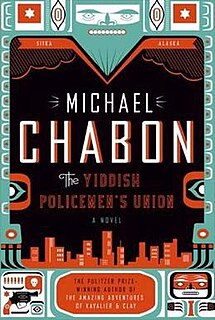Related Research Articles

Israeli settlements, or Israeli colonies, are civilian communities inhabited by Israeli citizens, overwhelmingly of Jewish ethnicity, built in violation of international law on lands occupied by Israel in the 1967 Six-Day War. Israeli settlements currently exist in the Palestinian territory of the West Bank, including East Jerusalem, and in the Syrian territory of the Golan Heights. East Jerusalem and the Golan Heights have been effectively annexed by Israel, though the international community has rejected any change of status in both territories and continues to consider each occupied territory. Although the West Bank settlements are on land administered under Israeli military rule rather than civil law, Israeli civil law is "pipelined" into the settlements, such that Israeli citizens living there are treated similarly to those living in Israel.

The West Bank is a landlocked territory near the Mediterranean coast of Western Asia, bordered by Jordan and the Dead Sea to the east and by Israel to the south, west and north. Under Israeli occupation since 1967, the area is split into 165 Palestinian "islands" under partial Palestinian National Authority civil rule, and 230 Israeli settlements into which Israeli law is "pipelined".

The Israeli–Palestinian conflict is one of the world's most enduring conflicts, with the Israeli occupation of the West Bank and the Gaza Strip reaching 54 years of conflict. Various attempts have been made to resolve the conflict as part of the Israeli–Palestinian peace process.

The term "Palestinian territories" has been used for many years to describe the territories occupied by Israel since 1967 within the former British Mandate for Palestine, namely the West Bank and the Gaza Strip. The International Court of Justice (ICJ) has referred to the West Bank, including East Jerusalem, as "the Occupied Palestinian Territory" and this term was used as the legal definition by the ICJ in the ruling in July 2004. More recently, the official United Nations (UN) terminology has been used, occupied Palestinian territory increasingly replacing other terms since 1999. The European Union (EU) also has adopted this usage. The term Occupied Palestinian Territory was used by the UN and other international organizations between October 1999 and December 2012 to refer to areas controlled by the Palestinian National Authority. The EU had utilized a parallel term Palestinian Authority territories occasionally during the same period.
The Judea and Samaria Area is an Israeli government-designated administrative territory that encompasses the Israeli-occupied West Bank excluding East Jerusalem. The territory is grouped together by Israeli authorities with the districts of Israel proper, largely for statistical purposes.

Abraham B. Yehoshua is an Israeli novelist, essayist, and playwright, published as A. B. Yehoshua. The New York Times called him the "Israeli Faulkner".

The Israeli-occupied territories refers to the territories occupied by Israel during the Six-Day War of 1967. It also sometimes refers to areas of Southern Lebanon where Israeli military was present to support local Lebanese militias during the Lebanese Civil War and after it. Originally, the sole governance of the territories were as the Jordanian-annexed West Bank, the Egyptian-occupied Gaza Strip, the Egyptian Sinai Peninsula, and the Syrian Golan Heights. The first use of the term 'territories occupied' was in United Nations Security Council Resolution 242 following the Six-Day War in 1967, which called for "the establishment of a just and lasting peace in the Middle East" to be achieved by "the application of both the following principles: ... Withdrawal of Israeli armed forces from territories occupied in the recent conflict ... Termination of all claims or states of belligerency" and respect for the right of every state in the area to live in peace within secure and recognized boundaries. In addition to the territories occupied following the Six-Day War, Israel also occupied portions of Southern Lebanon following the 1982 Lebanon War, and maintained a military presence there until withdrawing in 2000.

Breaking The Silence (BtS) is an Israeli Non-Governmental Organization (NGO) established in 2004 by veterans of the Israel Defense Forces (IDF). It is intended to give serving and discharged Israeli personnel and reservists a means to confidentially recount their experiences in the Occupied Territories. Collections of such accounts have been published in order to educate the Israeli public about conditions in these areas.
Israel and the apartheid analogy is a criticism of the Israeli government charging that Israel is practicing apartheid against Palestinians, primarily in its occupation of the West Bank; the term apartheid in this context may refer to the crime of apartheid in international law, or it may refer to an analogy in comparison with apartheid in South Africa. Some commentators extend the term to include treatment of Arab citizens of Israel, describing their status as second-class citizens. Proponents of the analogy claim several core elements of what they call "a system of control" in the occupied Palestinian territories meet the definition of apartheid in international law or are similar to what prevailed under the South African apartheid regime. These features regard such things as the ID system, the pattern of Israeli settlements, separate roads for Israeli and Palestinian inhabitants, Israeli military checkpoints, marriage law, the West Bank barrier, the use of Palestinians for cheaper labour, the Palestinian West Bank exclaves, inequities in infrastructure, legal rights, and disparities of access to land and resources between Palestinians and Israeli settlers. It is argued that, like South Africa, Israel may be classified as a settler colonial society, in violation of international law.

The Golan Heights, or simply the Golan, is a region in the Levant spanning about 1,800 square kilometres (690 sq mi). The region defined as the Golan Heights differs between disciplines: as a geological and biogeographical region, the Golan Heights refers to a basaltic plateau bordered by the Yarmouk River in the south, the Sea of Galilee and Hula Valley in the west, the Anti-Lebanon with Mount Hermon in the north and Wadi Raqqad in the east. As a geopolitical region, the Golan Heights refers to the border region captured from Syria by Israel during the Six-Day War of 1967; the territory has been occupied by the latter since then and was subject to a de facto Israeli annexation in 1981. This region includes the western two-thirds of the geological Golan Heights and the Israeli-occupied part of Mount Hermon.

The Yiddish Policemen's Union is a 2007 novel by American author Michael Chabon. The novel is a detective story set in an alternative history version of the present day, based on the premise that during World War II, a temporary settlement for Jewish refugees was established in Sitka, Alaska, in 1941, and that the fledgling State of Israel was destroyed in 1948. The novel is set in Sitka, which it depicts as a large, Yiddish-speaking metropolis.

Gershom Gorenberg is an American-born Israeli journalist, and blogger, specializing in Middle Eastern politics and the interaction of religion and politics. He is currently a senior correspondent for The American Prospect, a monthly American political magazine. Gorenberg self-identifies as "a left-wing, skeptical Orthodox Zionist Jew".

David Landau OBE was a British/Israeli journalist and newspaper editor. Landau was editor-in-chief of the Israeli newspaper Haaretz from 2004 to 2008. He was the founder and editor-in-chief of the paper's English edition from 1997 to 2004. Before joining Haaretz in 1997, Landau was the diplomatic correspondent of The Jerusalem Post for 12 years, and its managing editor for four years. After leaving Haaretz Landau became the Israel correspondent for The Economist.

Raja Shehadeh is a Palestinian lawyer and writer, who was born in Jaffa, Israel and who currently lives in Ramallah, West Bank.

Nov is an Israeli settlement and religious moshav in the southern Golan Heights, under the administration of Israel. Located to the east of the Sea of Galilee, it falls under the municipal jurisdiction of Golan Regional Council. In 2019 it had a population of 965.

Wolf Isaac Blitzer is an American journalist, television news anchor, and author who has been a CNN reporter since 1990, and who currently serves as one of the principal anchors at the network. He is the host of The Situation Room with Wolf Blitzer and until 2021, served as the network's lead political anchor.
The international community considers the establishment of Israeli settlements in the Israeli-occupied territories illegal on one of two bases: that they are in violation of Article 49 of the Fourth Geneva Convention, or that they are in breach of international declarations. The United Nations Security Council, the United Nations General Assembly, the International Committee of the Red Cross, the International Court of Justice and the High Contracting Parties to the Convention have all affirmed that the Fourth Geneva Convention applies to the Israeli-occupied territories.
Shimon Tzabar was a member of the editorial board of Israel Imperial News. He described himself as a "Hebrew-speaking Palestinian".
Idith Zertal is an Israeli historian, considered one of the "New Historians".

The Palestinian enclaves are proposed areas in the West Bank designated for Palestinians under a variety of US and Israeli-led proposals to end the Israeli-Palestinian conflict. The enclaves are often compared to the nominally self-governing black homelands created in apartheid-era South Africa, and are therefore referred to as bantustans. They have been referred to figuratively as the Palestinian archipelago, among other terms.